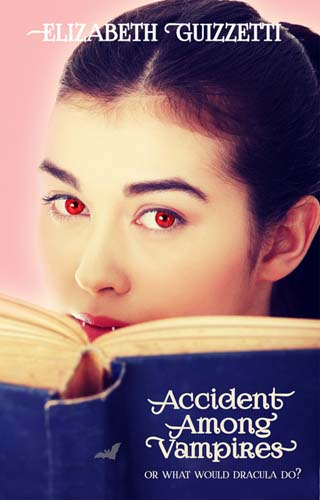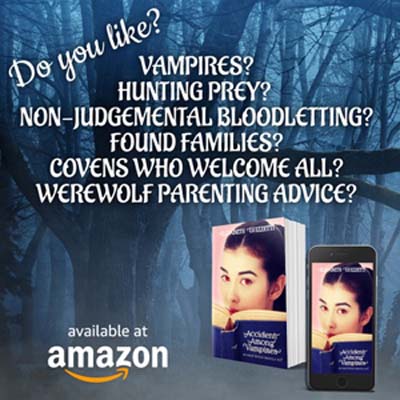Elizabeth Guizzetti has been a friend and peer for years. Today, she tells me about her love of language, how it shifts over the decades, and how she keeps slang of the past alive in her vampire books today.

Thank you for having me today, Jennifer. I’m so excited to talk about one of my favorite types of research.
As an author, I love all historical research, but one of my passions is idiomatic phrasing and slang. As everyone is aware, slang changes generationally and within generations. Sometimes a word slides through several groups and is dropped within a year. Idioms tend to last longer but still follow fads and expose a period's morality and generational fears. For an author, idioms can make handy shortcuts to depict the inner thoughts and even a character's personality.
One of the biggest pitfalls that an author can run into while using idioms and slang is the human habbit of classifying speech by decade or era. An author must still be careful to research when a word is actually coined if your novel has a definite place and time.
My latest novel, Accident Among Vampires or What Would Dracula Do? is set in 1951-52. I did quite a bit of research on Seattle and Issaquah during these years, but I also researched the post war era as a whole and previous generations as the book is about vampires. I chose phrases that they would say (or write in their journals as this is an Epistolary novel) which defines their true characters.
For example: for the character of Agata, I ensured her idioms are primarily religious in nature and very old-fashioned because she is deeply religious and was born in 1478 and Reborn in 1509 in Moldavia (Currently Romania). An idiom she uses often is she "knows her offspring/husband/whoever like the Lord’s Prayer.”
Derrik, a vampire born in 1824/Reborn 1851, uses religious phrasing too. They are more active, violent, and stereotypically curses of the Victorian Era. The idioms tend to appear when he is stressed or angry as literal curse words such as "Go to Blazes" and "Damn your eyes." He does not use the mild versions of these words, however, he does use “Blazes” as a filler word.
He also has a few secular phrases which he directs towards Norma, specifically, meaning nonsense. “Moonshine over water” and “All my eye.”
Now the protagonist of the novel, Norma, is a 1950's teenager who is culturally Christian but does not have deep religious beliefs.
To show the innocent part of her personality: she uses childish versions of known idioms such as "Mind your beeswax," which became popular in the 1930s but were still used in the ’50s. She speaks politely to adults. As period-appropriate, she calls adults: "Sir" or "Ma'am" and after she is a vampire, "Honored Individual."
But her slang has Beat Generation roots. The Beat Generation began as a literary group that included: Jack Kerouac, William S. Burroughs II, Allen Ginsberg John Clellon Holmes. "Beat Generation" was coined in 1948, but the movement started earlier.
This means by 1951, Norma would have thought the Beats were cool. She would have likely appropriated from movies and detective stories based out of New York, such as Broadway is my Beat (aired 1949 – 54) or Inner Sanctum (1941 – 52). (The LGBTQ relationships were often coded while drug use and Jazz were obvious threats.)
Some examples of Norma’s slang includes referring to the police as “The fuzz.”
She refers to adults who annoy her as “duds” or “squares.” She also calls certain vampires “pretend squares” since outwardly, they appear to conform to societal rules, but their personal lives do not conform.
As an aside, this also means she would never use a word like “Beatnik” because the word did not exist until 1958, but even if it did, it started as a derogatory word.)
My goal is to always give readers an idea of who the character really is and the life which they have lived. Some people might say a bookish, radio, and movie-loving teen girl from a 1950s farming town would be shocked by activities between consensual adults in a vampire coven. No, the shocking thing was vampires existed. And suddenly she was a full-blown telepath and ached for blood.
Here is one of her reactions which she writes in her diary:
“I tried to question Bill about the vampires of the Paper Flower Consortium and other covens. He would barely speak of them, except Derrik. Yet, sometimes I had visions of Bill with them. Sometimes I think I dreamed them.
Many vampires, Bill included, exist openly in ways that would have been hidden or simply not allowed if they were humans in Issaquah. I am not sure if that’s why vampires love the city or if we can exist in ways we wish because we’re vampires. At any rate, Mom would tell me to be polite, mind my beeswax, and don’t show my onions.
(I bet Derrik wants me to do the same.) ...”
If you want to use idioms in your work, some of my favorite online sources:
Of course, sometimes you just can't find the perfect turn of phrase you want, so I also occasionally make my own versions of expressions such as "hide your onions" or "don’t show your onions," which is something Norma's mother and her vampire father, Bill, say, based off the 1920s idiom, "You know one’s onions," which just means someone is knowledgeable about something.

ACCIDENT AMONG VAMPIRES (Or What Would Dracula Do?)
Issaquah, Washington, USA, 1951
My name is Norma Mae Rollins. I’m fourteen and an illegal vampire. I miss my mom, but new ghoulish appetites force me to remain with my creator. Bill didn’t mean to transform me. At least, that’s what he claims. His frightening temper, relentless lies, and morbid scientific experiments makes it hard to know what to believe.
However, someone snitched about Bill’s experiments to a nearby Coven. Now both of our corpses will burn. Bill won’t run. He is curious what happens to a vampire after final death. I don’t want to die again. It hurt so much the first time. Bill thinks his vampire boyfriend might shelter me. I must brave an eternal existence with elder vampires and other monsters who don’t think I ought to exist. Oh and figure out who I am allowed to eat.
A vampire’s reality is nothing like the movies.
Available on Kindle and Paperback: https://www.amazon.com/Accident-Among-Vampires-would-Dracula-ebook/dp/B08ZFQRYQS/
Signed Paperbacks can be found on my website: https://www.elizabethguizzetti.com/product-page/accident-among-vampires-paperback
---
Elizabeth Guizzetti is an author, podcaster, illustrator, and a collector of dragons — the ceramic kind. She loves writing about vampires. Elizabeth lives in Seattle with her husband and dog, Walnut. Visit her at Instagram or Twitter at @E_Guizzetti, FB Author Page: /Elizabeth.Guizzetti.Author or https://www.elizabethguizzetti.com